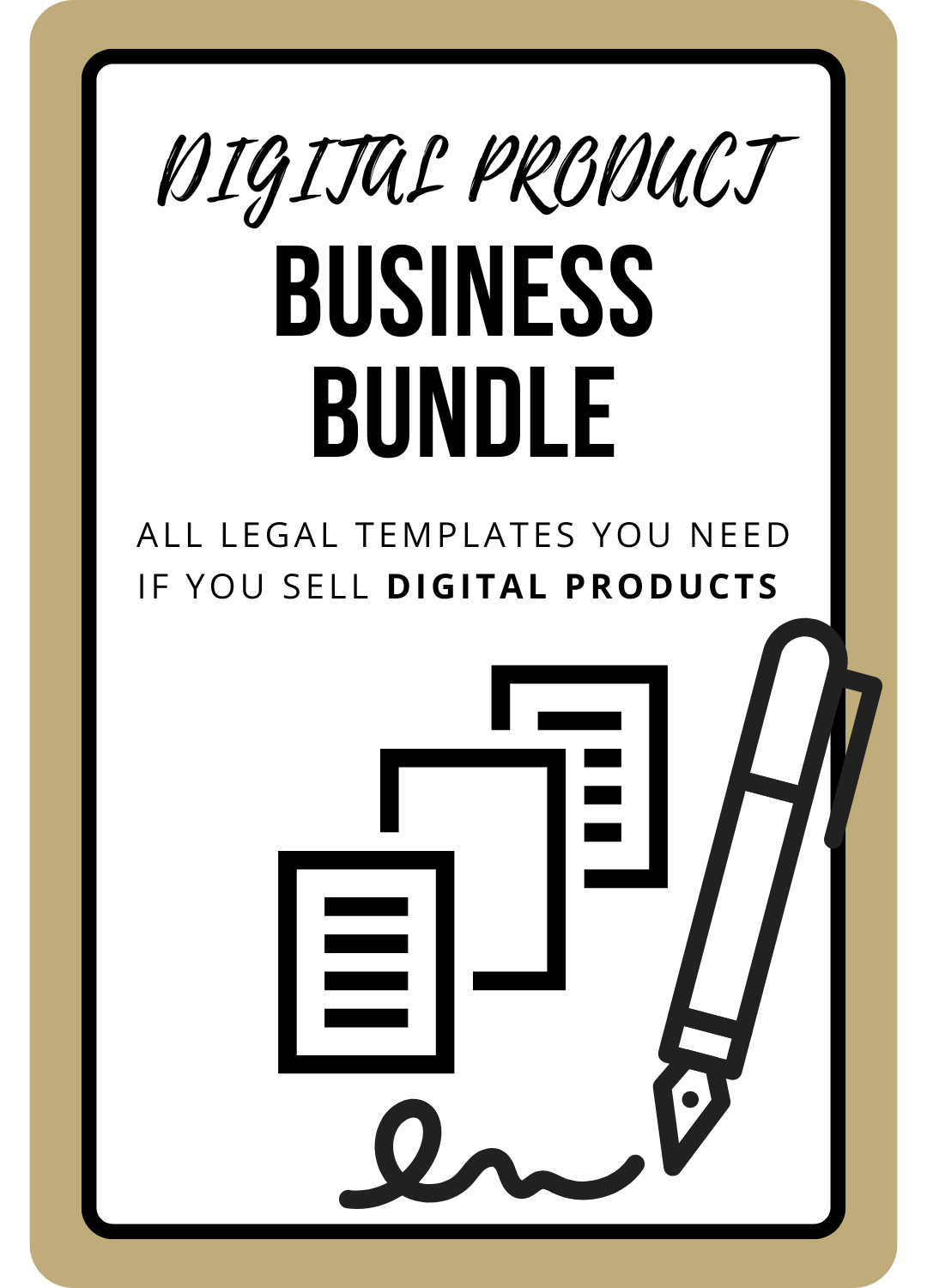10 Key Protections Your Terms and Conditions for Online Courses Must Have (Don’t Launch Without Them!)
Wondering what your terms and conditions for online courses really need to keep your business safe? The short answer: far more than a standard website disclaimer.
Launching your own course is exciting — but it also comes with risks most creators don’t see until it’s too late. Students sharing logins with friends, refund disputes draining your revenue, or even copycats stealing your hard-earned content can all happen if your terms and conditions for online courses don’t protect you.
As a lawyer who drafts contracts for creators every day, I’ve seen these issues play out in real life — and I’ve built safeguards that stop them before they start. That’s exactly why I created my Terms and Conditions for Online Courses Template: so you can launch with confidence knowing your content, money, and reputation are protected with ironclad terms and conditions for online courses free of fluff.
In this post, I’ll walk you through 10 key protections your terms and conditions for online courses must have. By the end, you’ll know exactly how to safeguard your course with a proper terms and conditions for online courses PDF on your site — and avoid the legal headaches that could otherwise cost you time, money, and peace of mind.
This post is all about the key protections that terms and conditions for online courses must have to protect your content, money, and peace of mind.
Essential Terms and Conditions for Online Courses
The 10 Key Protections for Ironclad Course Terms and Conditions Free of Fluff
1. Prohibition to Give Access to Others
As a course creator, you worked hard to build your program — and you deserve to be paid fairly for it. The last thing you want is students sharing logins with friends or entire communities getting access for free.
That’s why your terms and conditions for online courses must clearly state:
Non-transferable, non-sublicensable license – Students get a license to use your course, but they can’t pass it on or grant access to anyone else.
Account secrecy – Students may not share their login credentials or any details that would allow others to sneak into your course.
Without these protections, you risk losing revenue every time a single purchase turns into a “group access pass.”
👉 Want airtight wording that stops login sharing before it starts? My Terms and Conditions for Online Courses Template already includes these protections (and more), ready to customize to your business.
2. The Right to Revoke Access
Even the best students don’t always follow the rules. Some may fail to pay installments, charge back payments, or even break your community guidelines. If your terms and conditions don’t give you the explicit right to revoke access, you could be stuck letting them stay — while losing money or peace of mind.
Proper terms and conditions for online courses free of fluff should clearly state that you can:
Suspend access temporarily – for smaller breaches, such as late payment or inappropriate comments, if you want to give them a second chance.
Terminate access permanently – for serious breaches like copying your content, sharing materials with others, or making defamatory claims against you.
💡 Example: A student joins your Facebook group, bullies other members, and spreads negativity. Without a revocation clause, you risk looking powerless. With the right terms, you can protect both yourself and your community by removing them immediately.
👉 My Terms and Conditions for Online Courses Template includes built-in options to suspend or ban students, so you’re never stuck with a rule-breaker.
3. Prohibition of Sharing the Course Content with Others
It’s not just about login details — students can also share your actual course materials without giving away access. Think: screen-recorded videos, copied workbooks, or PDF handouts being passed around freely.
That’s why your terms and conditions for online courses must include a separate prohibition against sharing course content itself.
The terms and conditions for online courses pdf on your site must make it crystal clear that students are not allowed to:
Download and forward your PDFs, workbooks, or slides.
Screen-record your videos and upload them elsewhere.
Share any course materials outside of the platform.
💡 Example: A student could keep their login private but still email your entire workbook to a friend. Unless your terms prohibit sharing materials directly, you have little legal ground to stop it.
👉 My Terms and Conditions for Online Courses Template already covers both access sharing and content sharing, so you don’t have to worry about sneaky loopholes.
4. Prohibition to Copy Your Course
One of the biggest fears for course creators is seeing their hard work copied, rebranded, and sold by someone else. Unfortunately, without strong intellectual property protections in your terms, it’s far too easy for students (or competitors) to steal your ideas.
Your terms and conditions for online courses should explicitly forbid students from:
Copying your course content word-for-word.
Recreating your methods or strategies in their own materials.
Using your course content commercially, such as reselling it or using it to create a competing program.
💡 Example: A student takes your signature framework, changes a few words, and markets it as their own “original” course. Unless your terms prohibit this, you’ll struggle to take action.
👉 My Terms and Conditions for Online Courses Template contains strong intellectual property clauses that stop copycats in their tracks and protect your business.
5. Disclaimers for the Course Content
No matter how good your course is, not every student will get the same results. Some may misunderstand your lessons, skip the work, or simply expect miracles. Others may find a piece of information that later becomes outdated. Without disclaimers, all of those issues could come back on you.
That’s why your terms and conditions for online courses should include disclaimers such as:
No professional advice – the content is educational, not legal, medical, financial, or other professional advice.
Incompatibility of the student - not every student will have the same skills, background, or dedication. Students are responsible for ensuring they meet the course requirements.
Results vary – students are responsible for their own outcomes.
Technology requirements – you’re not liable if they don’t have proper devices or Wi-Fi.
Errors and outdated info – content may contain mistakes or become outdated.
💡 Example: A student claims your course “didn’t work” for them and demands a refund. With disclaimers in place, you’re protected because you never promised specific results.
For a complete list of all the disclaimers you need in your terms and conditions for training courses, read this blog post on the 10 Must-Have Disclaimers for Your Online Course Terms and Conditions (Protect Your Income & Content).
👉 My Terms and Conditions for Online Courses Template includes professionally drafted disclaimers so you’re never blamed for things outside your control.
6. Protection Against Third-Party Resources and Websites
Most courses include external resources — like recommended tools, articles, or even affiliate links. But here’s the problem: those links can change or disappear without warning. Without the right disclaimer, students could hold you responsible if a third-party site is down, changes its content, or charges unexpected fees.
Your terms and conditions for online courses should clearly state that:
You’re not responsible for third-party websites, resources, or services mentioned in your course.
Links may change at any time, without notice.
If you use affiliate links, you disclose them (as required by advertising laws).
💡 Example: You link to a free tool during your course. Months later, that tool becomes a paid service. A student might complain or accuse you of misleading them. With the right terms, you’re protected.
👉 My Terms and Conditions for Online Courses Template includes optional affiliate link wording and third-party disclaimers, so you stay compliant and protected.
7. Protection Against Non-Payment
One of the biggest risks for course creators is giving full access before students finish paying. If they stop halfway, you’re left chasing money while they still enjoy your content.
That’s why your terms and conditions for online courses should spell out exactly how payments work — and what happens if a student doesn’t pay on time. You can choose to:
Restrict access – students only unlock the portion of the course they’ve paid for.
Suspend or revoke access – students gain full access upfront, but if they miss an installment, their access is suspended or terminated without refunds of amounts already paid.
💡 Example: A student enrolls in your $1,000 course with a 4-pay plan, pays the first $250, then disappears. Without the right clause, you’re stuck. With it, you can legally cut access and protect your revenue.
👉 My Terms and Conditions for Online Courses Template gives you flexible options for both upfront and installment payments — so you can choose what works best for your business.
8. Protection Against Refund Requests
Refunds are one of the trickiest parts of running an online course. Some students may buy with the intention of requesting a refund later, while others might try to abuse vague refund policies. If your terms aren’t airtight, you could lose both money and time.
Your terms and conditions for online courses should clearly state:
Whether refunds are offered at all – a strict “no refunds” policy is allowed if it’s written clearly.
Conditions for eligibility – for example, refunds only within 7 days, or only if the student hasn’t accessed more than 10% of the course.
Process for requesting refunds – including deadlines and written notice requirements.
💡 Example: A student binge-watches your entire course, then emails you claiming they want a “money-back guarantee” you never offered. With the right terms in place, you’re not obligated to pay them a cent.
Learn exactly how to set an ironclad refund policy in this blog post on the 11 Must-Haves for Your Course Terms and Conditions.
👉 My Terms and Conditions for Online Courses Template includes multiple refund policy options you can choose from, so you’re protected no matter how you decide to structure your offers.
9. Protection of Your Reputation
Not every student will love your course — and that’s okay. The danger comes when unhappy students turn vocal and damage your brand. A few negative comments, public posts, or false claims can seriously impact your reputation if you don’t set boundaries up front.
That’s why your terms and conditions for online courses should include a non-disparagement clause, making it clear that students cannot:
Post offensive, defamatory, or misleading statements about you or your course.
Use your course content in ways that discredit or insult your brand.
Harass, abuse, or bully you or other students in related communities (like Facebook groups).
💡 Example: A student posts a rant on social media saying your course was “a scam,” even though they never completed it. With a non-disparagement clause, you can enforce consequences and protect your business.
👉 My Terms and Conditions for Online Courses Template includes strong reputation safeguards, so one unhappy student can’t undo your hard work.
10. Protection of Your Students
If your course includes a private community — like a Facebook group, Slack channel, or forum — you’re not just responsible for the content you deliver. You’re also responsible for the environment your students interact in. Without clear rules, a few disruptive students can ruin the experience for everyone else.
Your terms and conditions for online courses should give you the right to:
Remove or suspend disruptive students who harass, bully, or disrespect others.
Terminate access entirely if a student repeatedly breaks community rules.
Set clear standards of conduct so students know upfront what behavior is unacceptable.
💡 Example: A student starts spamming your group with hateful or inappropriate comments. Without the right terms, your only option is to manually moderate and hope for the best. With them, you can remove toxic members quickly to keep your community safe.
👉 My Terms and Conditions for Online Courses Template includes community protection clauses that safeguard both you and your students, helping you build a positive, supportive space.
The ULTIMATE Terms and Conditions for Online Courses Template
Publishing your course is a huge milestone — but without strong terms and conditions for training courses, you leave yourself exposed to copycats, refund disputes, non-payment issues, and even reputation damage.
These 10 protections aren’t just “nice to have” — they’re what stand between a smooth-running course business and a legal nightmare.
The good news? You don’t have to draft all of this from scratch.
👉 My Terms and Conditions for Online Courses Template includes all of these protections (and more), fully customizable to your business. With it, you’ll:
Safeguard your content and stop copycats.
Protect your income with clear payment and refund terms.
Keep your community safe and positive.
Shield your reputation from harmful comments.
Launch with peace of mind knowing your legal bases are covered.
Don’t wait until a student dispute costs you time, money, or stress. Get your Terms and Conditions for Online Courses Template today and protect your business before you launch.
Want Full Protection for All Your Digital Products (Beyond Just Terms and Conditions for Training Courses)?
Your online course is just one part of your business. If you’re also selling eBooks, templates, downloads, or other digital products, you’ll need more than just terms and conditions for online courses to cover yourself.
That’s where my Digital Product Business Bundle comes in.
Inside the bundle, you’ll get:
📘 Terms and Conditions for Online Courses (the full version we covered here)
📕 Terms and Conditions for Digital Products to protect your other offers
🌐 Legal Website Bundle (Privacy Policy, Website Terms, and Disclaimer)
✍️ Testimonial Release Form so you can legally share glowing reviews
🎁 And more — all at a lower price than buying each template separately
👉 With the Digital Product Business Bundle, every corner of your business is protected — your courses, your downloads, your website, and your reputation.
➡ Get the Digital Product Business Bundle here and save money while securing your entire digital business.
This post was all about the protections your terms and conditions for online courses must have to protect their course content, business, and money.
✨ Want to dive deeper? Check out these posts next:






